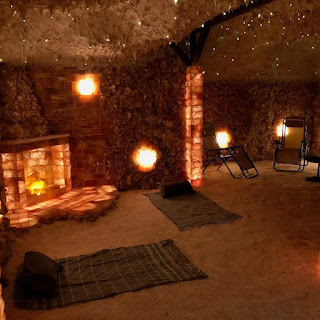Miners would chisel, hammer and grind the salt which in turn would produce micro-sized salt particles that saturated the air and inhaled. With salt naturally being antibacterial, antifungal and antimicrobial, there were also very ideal conditions below the Earth’s surface creating the quality of the environment. With the perfect mix of humidity, temperature, air pressure and circulation, the air lacked airborne pollutants such as radon and pollen.
Dr. Boczkowski founded and opened the first health resort facility at the Wieliczka Salt Mine in Poland.
At that time, throughout Europe, other physicians would have their patients go underground into hollowed-out salt chambers of salt mines referred to as “caves” for respiratory therapy, as underground health resorts and sanatoriums. People would spend days in the “caves” since speleotherapy was providing a significant improvement on their health and wellbeing.
Dry salt therapy, or halotherapy, is a relatively new concept, but only to the United States.
In the 1970’s, Russians started researching and developing the technology of how to recreate the sensitive microclimate and micro-sized particles for inhalation for those who did not have the time nor the means to visit a resort. In 1976 the first halogenerator was developed and halotherapy, the above- ground version of speleotherapy, was born! This device grinds pure grade pharmaceutical sodium chloride (salt) into micron-sized particles that are dispersed into the air. The first above-ground, man made salt rooms using a halogenerator appeared in clinics, hospitals and daycare centers throughout Russia and Eastern Europe.





No comments:
Post a Comment